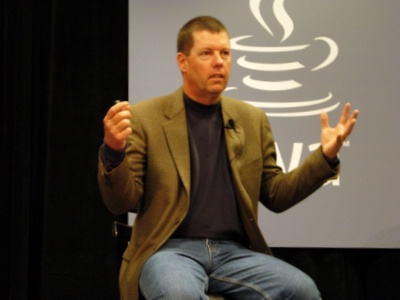At Harvard conference, head of Sun Microsystems asserts there is only one compatible Java
May 27, 1998 — Sounding like a live advertisement for Sun Microsystems’s Java programming language, Sun Chairman, CEO, and President Scott McNealy, in Cambridge, MA, for the Harvard Conference on Internet & Society, scarcely spoke of either the Internet or society.
When he wasn’t touting the wonders of Java and its myriad applications, McNealy was making thinly disguised (and undisguised) jabs at rival Microsoft Corp. Sun has filed suit against Microsoft alleging that the software competitor violated terms of its Java licensing agreement.
Take a cup of coffee and add three drops of poison, McNealy said, “and what have you got? Windows.” In between these barbs, which drew appreciative laughter from the crowd of academics and IT professionals, McNealy predicted that Java is fast becoming the language of choice in computers that operate vehicles, in consumer appliances, and in smart cards, which store monetary values allowing consumers to buy goods without carrying around cash or credit cards.
Such uses of computers will become the network computer prototype of the future, McNealy said. In contrast to the position of Oracle Corp. Chairman Larry Ellison, who yesterday continued his ongoing message about the likely spread of network computers, McNealy doesn’t believe that those thin clients will become the desktop rage.
Instead, network computers that retrieve data and applications from servers as needed will be widely used in kiosks, for point-of-sale terminals, and as the means to operate increasingly smarter cellular telephones, set-top boxes, and other consumer devices, McNealy said.
“The last place you will see it is on your desktop at work,” McNealy said. “For some reason, CEOs enjoy giving you 10 million lines of fiddle-around code and watching you reboot or whatever.”
McNealy was armed with a cellular phone and a desk phone with a built-in screen as examples. But he also had on a Java Ring, which he passed to spectators in the front row of the theater. The ring can be used for access to worksites or computers that traditionally have been password protected. The same Java-enabled technology also will enter the healthcare field, used in plastic identification bracelets given to hospital patients, McNealy said.
During a “conversation” with two Harvard University professors who asked him questions after his brief keynote remarks, McNealy strongly argued that there is only one Java programming language — and it belongs to Sun: “There’s only one version of Java,” he said, “and that’s the (Sun) compatible version.” While developers are welcome to contribute comments and thoughts regarding Java and its specifications, McNealy emphasized that Sun wants to keep the language pure.



